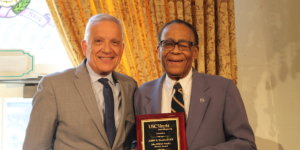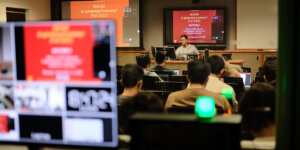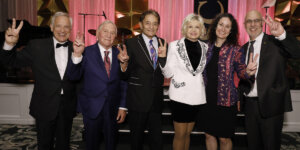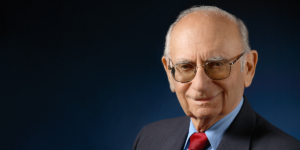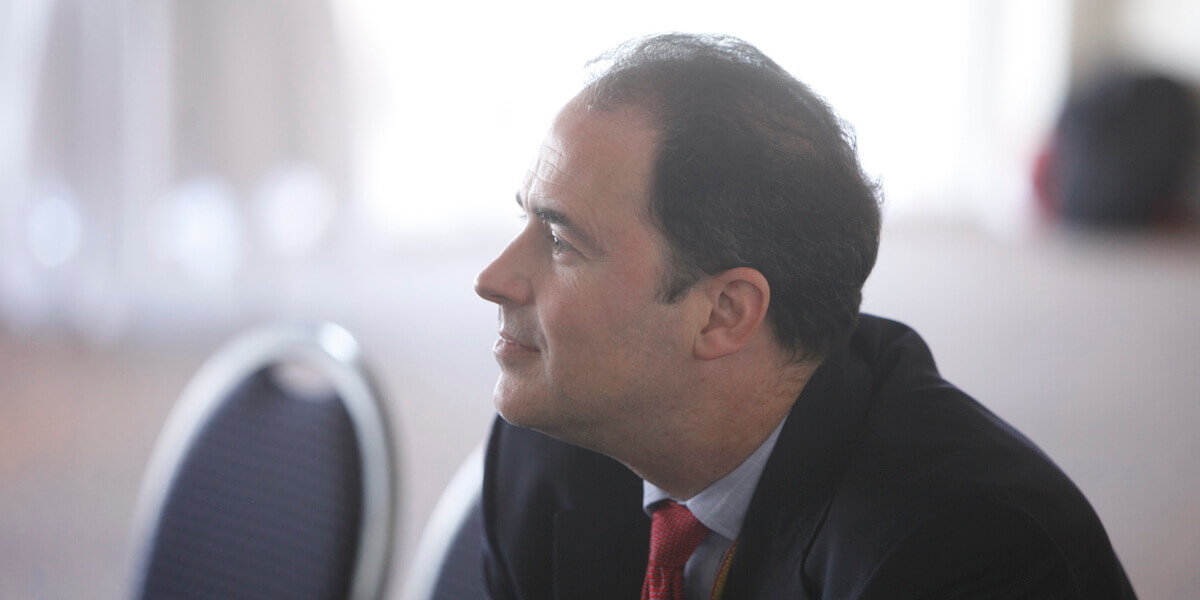
Photo Credit: © 2012 Steve Cohn/ Steve Cohn Photography
John O’Brien, Louise L. Dunn Endowed Professor in Electrical Engineering and Executive Vice Dean of the USC Viterbi School of Engineering, hated two things: titles and vegetables. So, for the remainder of this story, he will be referred to simply as John – and there will be no mention of broccoli at all.
John came to USC Viterbi in 1997 as an assistant professor in the Ming Hsieh Department of Electrical Engineering. In his 20 years here, he accomplished so much. He won a coveted Presidential Early Career Award for Scientists and Engineers and an NSF Career Award. He was a senior member and distinguished lecturer of the IEEE Photonics Society, and fellow of the Optical Society of America. He graduated 19 Ph.D. students and personally developed and taught several new courses for USC Viterbi in electrical engineering. In 2006, he joined the Dean’s office where he would spend the next 11 years helping to transform USC’s engineering program into what it is today. As humble as he was accomplished, he would likely be thoroughly embarrassed by this public celebration of his work.
It would be wrong to assume that John was so loved because of what he accomplished for the school. In fact, the exact opposite is true: John accomplished so much because he was so loved.
Said USC Viterbi Dean Yannis Yortsos, “At USC, we have often used the term ‘transformative faculty’ to denote faculty with a non-trivial impact. John epitomized the term. He defined it in its most real and impactful sense.”
On April 21st, the USC community came together to remember John’s life. As co-workers, childhood friends, students, and administrators shared their memories, one thing became clear: over the past decade, through a profound commitment to service, John O’Brien arguably did more to transform the collective culture of USC Viterbi than anyone else.
But it would be wrong to assume that John was so loved because of what he accomplished for the school. In fact, the exact opposite is true: John accomplished so much because he was so loved.
“John was the bridge that brought many of us together. He created a unique balance and support structure,” said Kelly Goulis, senior associate dean for Graduate and Professional Programs, and John’s longtime friend.
Throughout the day, everyone that worked with John echoed these sentiments. “In my opinion,” said Professor Martin Gundersen, “he was the most liked person in the entire school of engineering. He was so wonderful and honest with people, highly intelligent, and never said anything bad about anyone.”
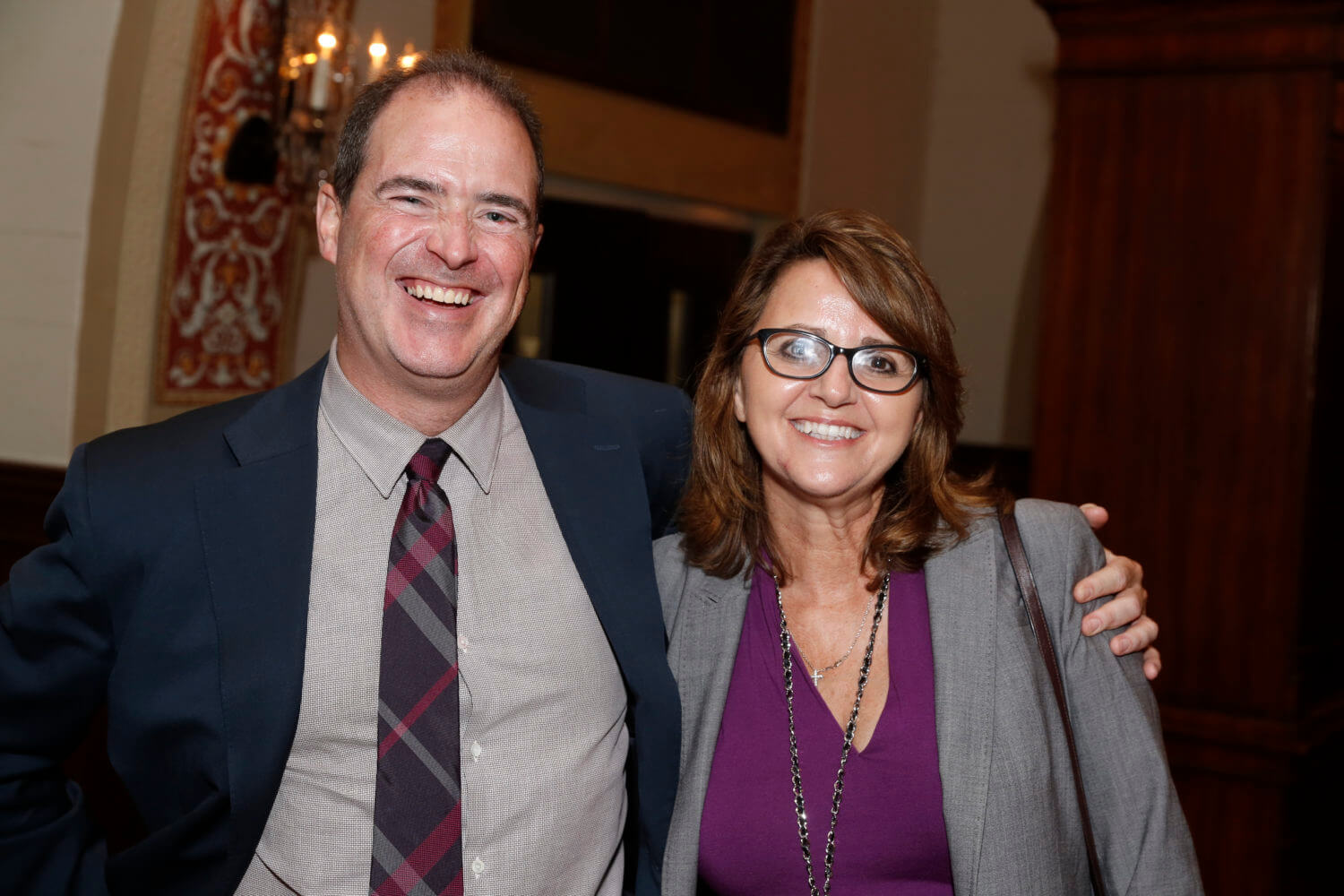
John and Kelly at the
USC Viterbi Scholarship & Fellowship Dinner in 2016. Photo by: Steve Cohn
Professor Timothy Pinkston, Vice Dean for Faculty Affairs and former eagle scout, used the scout law to describe him: “A Scout is trustworthy, loyal, helpful, friendly, courteous, kind, obedient, cheerful, thrifty, brave, clean, and reverent. That was John.”
While John was an outstanding researcher with a brilliant mind for science, his time as executive vice dean proved that his greatest strength may have been his ability to build and nurture personal relationships.
“When John left electrical engineering to join the administration, he was naturally the recipient of all sorts of complaints,” said Hossein Hashemi, Professor of electrical engineering and another close friend. “If you haven’t been at a university, you don’t know how much faculty can complain. We complain about everything. From research labs, to intellectual property, to promotion opportunity, to lack of supporting staff, to teaching mode and more.”
But John would patiently sit through all sorts of complaints and always give a carefully measured response in a calm and polite manner. And always with his trademark smile.
In all the years John spent in the Ming Hsieh Department, he and Hashemi only had one disagreement – it was over John’s choice to join the administration. “After John joined the dean’s office, I actually nominated him for the electrical engineering department chair position three times. I was willing to do anything to get him back,” Hashemi said. “Of course, he kindly rejected all the offers, citing his responsibility to the school.”
“Perhaps the only way that I can summarize my feelings is this: John was simply the best human being I got to know at USC. I dearly miss him.” – Professor Hossein Hashemi
John’s leaving the electrical engineering department was not easy on anyone. “When John left our department, I was afraid I might be losing a friend. Of course, I was wrong,” said Professor Dan Dapkus. “Although John was a generation younger than me, I considered him my peer. He taught me about science and people; and how to better interact with my own adult sons.”
It was these qualities – his ability to genuinely listen, the deep respect he had for everyone’s work, his sense of humor – that brought him such success at such a high level. Or, as Richard Roberts, chair of the Mork Family Department of Chemical Engineering and Materials Science said, “The sheer humanity of the man.”
If John’s humanity was the tool with which he accomplished so much, his commitment to service was what drove him.
“More than once I asked John when he would consider buying a home, as I noticed he was still living in an apartment. But John never gave me an exact reason why,” said Eun Sok Kim, co-chair of the Ming Hsieh Department of Electrical Engineering. “But when I heard, after his passing, that his favorite charity was the Dominican Friars, I connected some dots and realized that John was living a life for others.”
Dean Yortsos got to see John’s commitment to service firsthand every day. “I would regularly ask John over the years, aware of his immense scientific potential, and all the personal and professional opportunities he was missing while pursuing an administrative career if he was sure he wanted to continue in the dean’s office,” he said. “John would always reply: ‘Yannis, it is a great honor to serve.’”
That commitment to service was what allowed him to so effectively lead several major initiatives that have helped shape the future of USC Viterbi. His steady leadership of the Information Sciences Institute over a two-year interim period was critical to the future of USC’s crown jewel research institute. Another project close to his heart was directing the rollout of the new nanofabrication facility, set to open this November in the USC Michelson Center. In a surprise announcement at Friday’s memorial, Dean Yortsos revealed that the nanofabrication facility will be named in his honor: the John O’Brien Nanofabrication Laboratory. And, in a further celebration of his life, the school has named the annual Faculty Service Award in John’s honor as well. The award, which John received posthumously this year, is given to a member of the Viterbi faculty who best exemplifies the values he held so dear. The Min and Tayebi families, supporters of USC Viterbi, generously endowed the Faculty Service Award in John’s honor.
That same commitment to service may have also blinded him at times. “I remember once, the two of us were chatting outside the electrical engineering building,” said Professor Alan Willner. “John was very handsome and would always get looks from young women who passed by. When I joked that I felt like the ugly cousin standing next to him, he had absolutely no idea what I was talking about.”
While John was a bridge to his colleagues, he was an inspiration to his students. In his time at USC he graduated several Ph.D. students, many of whom spoke about the mark he left on their lives.
“In the Ph.D. world, your pedigree is something you’re proud of, and you see traits of advisors live on in students,” said Ashkan Seyedi, a former Ph.D. student. “Today I’m so proud to say that I was in his group and he was my advisor. I will try to exemplify those characteristics that would make John proud.”
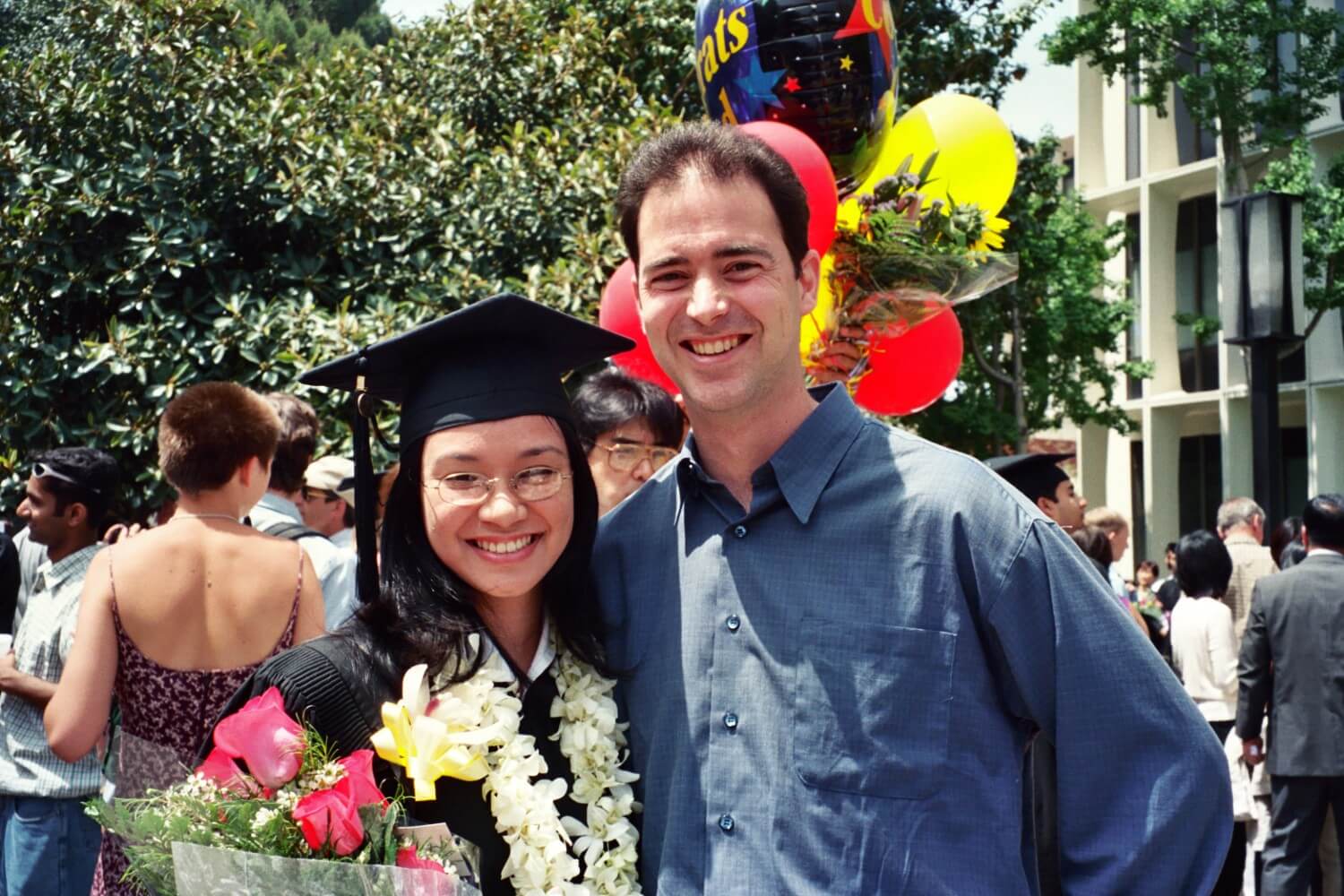
John with former student Analyn Schneider at her graduation from USC Viterbi.
“John was always approachable, always available and always ready to listen,” said another student, Andrew Stapleton. ““I first met John in the fall semester of my freshman year of college. He was a fantastic role model and the mentor who counseled me to pursue a Ph.D. degree. If it were not for John, I would not have followed that path.”
“John loved collecting things. He collected books, ancient coins, baseball cards, guitars,” said former student Analyn Schneider. “But the most important thing he collected was good friends and colleagues. And we are better people for being included in his collection.”
Professor Gundersen – one of many people with a claim to John’s hiring decision – remembers the last technical discussion he had with his friend. “It was about the Pauli Exclusion Principle, which states that based on the kind of angular momentum that an elementary particle has, you can either put it in a box with another particle, or you can never do so. Electrons fall into the latter category; they can’t be in the same quantum state with other electrons. But photons like to be together with other photons in the same space. John was like that photon, he was happiest when he was with others.”
His fellow photons at USC Viterbi have been forever changed by his life.
“I will miss his friendship, I will miss his intellect, but most of all, I will miss his smile. What a great smile,” said Dapkus.
Said Hashemi, “John was an outstanding researcher, a great educator, an effective administrator and a wonderful colleague. But more importantly, he was a good man. A very good man. Perhaps the only way that I can summarize my feelings is this: John was simply the best human being I got to know at USC. I dearly miss him.”
Kelly Goulis has been struggling to comprehend what working at USC will be like without her friend. During Friday’s memorial, she shared a story that was told to her by the mother of a USC Viterbi student who recently passed away. The mother said, “When I’m very sad, I often imagine myself sitting in a beautiful garden. There I see a basket, filled with very small, beautifully wrapped presents. I see myself reaching for one of the presents, unwrapping it slowly and inside is a beautiful memory.”
John has left Kelly, and all of us, with a very full basket of beautiful memories.
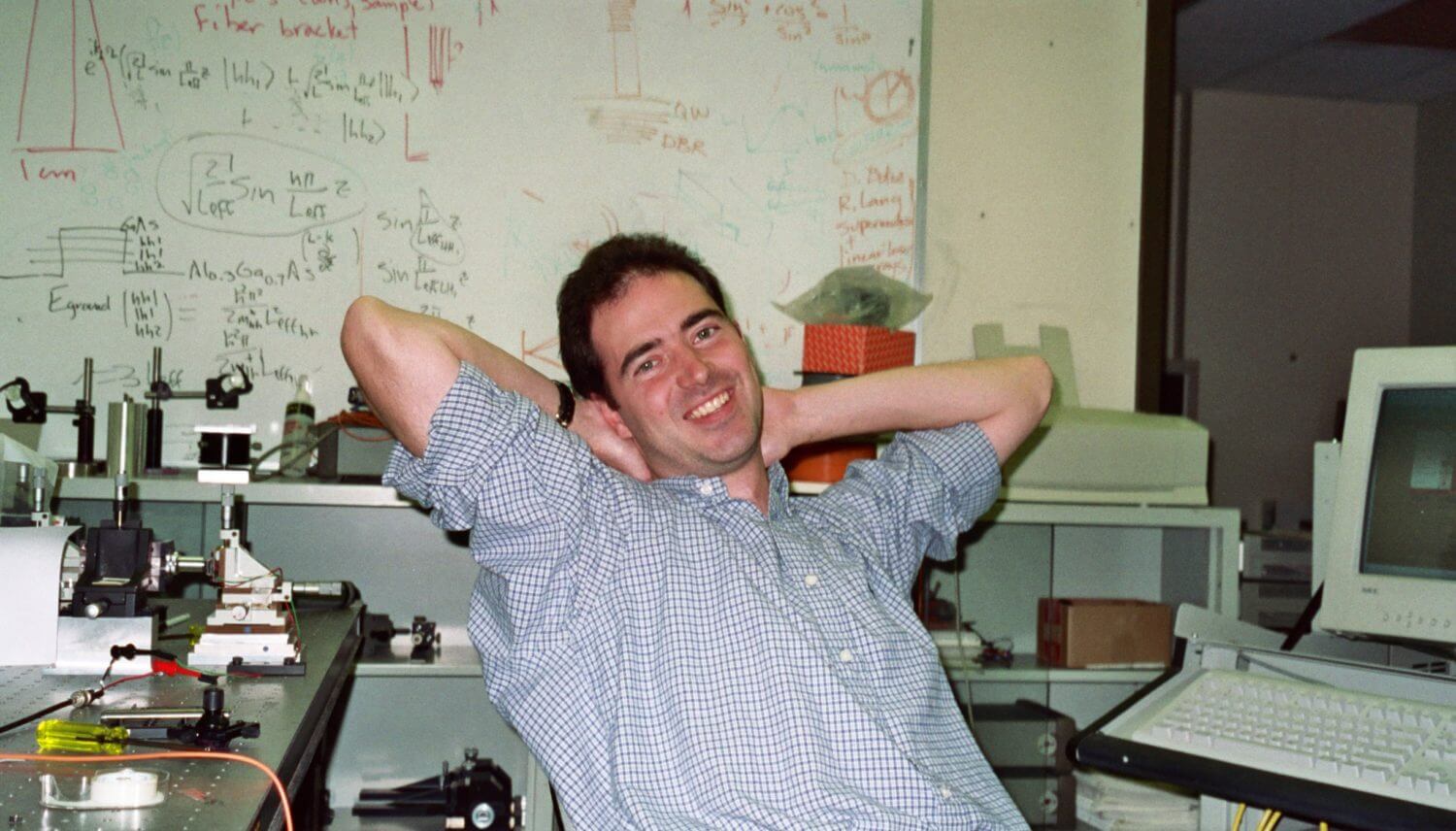
Published on April 26th, 2017
Last updated on November 8th, 2017




